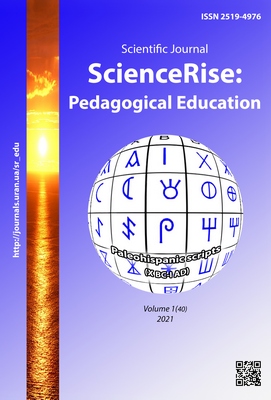Requirements for the value component in professional training of foreign language linguists in the age of changing axiological guidelines
DOI:
https://doi.org/10.15587/2519-4984.2021.224434Keywords:
values, value guidelines, value and semantic sphere, value education, axiology, pedagogyAbstract
The change in axiological guidelines in the current social and cultural situation makes the problem of preserving individuality, particularly values, extremely relevant. Value education is an effective means of solving this problem. The modern professional training of future foreign language linguists cannot ignore the need to turn to axiological discourse and to ensure acquiring axiological competencies. Recognition of the influence of such axiological guidelines changes on the educational environment leads to addressing the value theory, that is axiology, and determines the need to gain axiological dimension within the educational process.
The purpose of the study is to determine the substantive requirements for the value component in the professional training of future linguists regarding changing axiological guidelines. The validity of the formulated provisions and conclusions is ensured by the involvement of acts, regulating the training of future specialists in foreign philology both in Ukraine and in European countries and the use of developments in the field of philosophy of education, modern axiological and pedagogical knowledge.
Based on the analysis, it is substantiated, that the result of professional training of foreign languages linguists should lie in the involvement and assimilation of (1) knowledge values, (2) teacher’s identity values, (3) interrelation values in education. The outlined system of values correlates with the requirements of the Common European Framework (as it regulates the development of the future specialist of the corresponding linguistic base with all possible professional competencies)
References
Tykholaz, S. I. (2010). Struktura, kryterii ta pokaznyky profesiinoi spriamovanosti studentiv medychnoho universytetu. Suchasni informatsiini tekhnolohii ta innovatsiini metodyky navchannia u pidhotovtsi fakhivtsiv: metodolohiia, teoriia, dosvid, problemy, 26, 512–518.
Vitiuk, V. V. (2017). Hotovnist pedahohiv do zmin v umovakh realizatsii Kontseptsii «Nova ukrainska shkola». Pedahohichnyi poshuk, 2, 3–6.
Lovat, T., Toomey, R. (Eds.) (2009). Values Education and Quality Teaching. Amsterdam: Springer Netherlands, 172. doi: http://doi.org/10.1007/978-1-4020-9962-5
Common European Framework of Reference for Languages: Learning, teaching, assessment – Companion Volume. Available at: https://www.coe.int/en/web/common-european-framework-reference-languages Last accessed: 28.11.2020
Pro zatverdzhennia pereliku haluzei znan i spetsialnostei, za yakymy zdiisniuietsia pidhotovka zdobuvachiv vyshchoi osvity (2015). Postanova Kabinetu Ministriv Ukrainy No. 266. 29.04.2015. Available at: https://zakon.rada.gov.ua/laws/show/266-2015-%D0%BF#n11
Kyriakova, A. V. (2010). Teoryia tsennostei – metodolohycheskyi bazys aksyolohyy obrazovanyia. Aksyolohyia y ynnovatyka obrazovanyia, 1. Available at: http://www.orenport.ru/axiology/docs/3/3.pdf Last accessed: 06.07.2020
Pérez-Jorge, D., Medero, F., Molina-Fernández, El. (2017). A Study of Educational Programmes that Promote Attitude Change and Values Education in Spain. Asian Social Science, 13 (7), 112–130. doi: http://doi.org/10.5539/ass.v13n7p112
Świtała, E. (2013). Values Education ñ a Reality or Myth in Polish Schools. Discourse and Communication for Sustainable Education, 4 (1), 57–66. doi: http://doi.org/10.2478/dcse-2013-0005
Utiuzh, I. H. (2011). Sotsialno-filosofska interpretatsiia aksiolohichnykh idei ukrainskoi osvity. Humanitarnyi visnyk ZDIA, 44, 38−42.
Roadmap for Implementing the Global Action Programme on Education for Sustainable Development (2014). Paris: United Nations Educational, Scientific and Cultural Organisation. Available at: https://sustainabledevelopment.un.org/content/documents/1674unescoroadmap.pdf Last accessed: 21.11.2020
United Nations Millennium Declaration. General Assembly resolution 55/2 of 8 September 2000 (2000). The Office of the High Commissioner for Human Rights. Available at: https://www.ohchr.org/EN/ProfessionalInterest/Pages/Millennium.aspx Last accessed: 08.10.2020
Downloads
Published
How to Cite
Issue
Section
License
Copyright (c) 2021 Лилия Осиповна Свыщ

This work is licensed under a Creative Commons Attribution 4.0 International License.
Our journal abides by the Creative Commons CC BY copyright rights and permissions for open access journals.
Authors, who are published in this journal, agree to the following conditions:
1. The authors reserve the right to authorship of the work and pass the first publication right of this work to the journal under the terms of a Creative Commons CC BY, which allows others to freely distribute the published research with the obligatory reference to the authors of the original work and the first publication of the work in this journal.
2. The authors have the right to conclude separate supplement agreements that relate to non-exclusive work distribution in the form in which it has been published by the journal (for example, to upload the work to the online storage of the journal or publish it as part of a monograph), provided that the reference to the first publication of the work in this journal is included.







